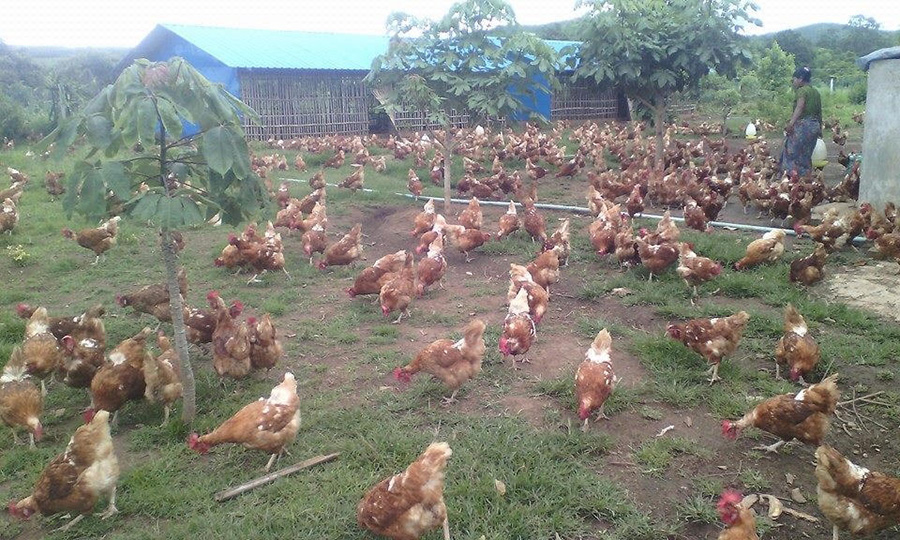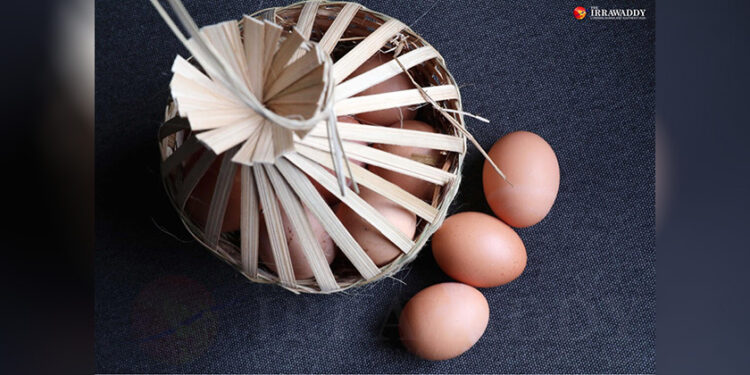Shwe Taung Nyo Gyi farm is making waves in Yangon with its local, organic poultry and natural eggs.
The farm, founded in 2017 by friends Zaw Ye Naung and Marn Thu Shein, is certified by the Myanmar Organic Agriculture Group (MOAG).
“We are both fathers who wanted to feed healthy, chemical-free foods to our children. That’s how we started,” said 34-year-old Zaw Ye Naung.
He used to buy what he thought were natural eggs at a local market when his son was young, but one day he to the market and his trusted vendor had closed.
“So, I went to the vendor’s home. Unfortunately, I found out he had been lying to me. I saw him bleaching the eggs to whiten them. I was so mad,” Zaw Ye Naung said.
“I don’t trust those kinds of vendors anymore. I don’t mean that all egg vendors do the same thing, just that I lost trust. I talked to my close friends about what we should feed our children and we decided to do it ourselves,” he added.
They chose to produce eggs first because of the nutritional value.
“We started to provide young and old people with healthy, chemical-free eggs. But we wanted scientific proof from a lab of the quality because we want our customers to trust us,” Zaw Ye Naung said.
He contacted the MOAG for advice.
“We started the farm with a lot of help from the MOAG,” he said.
Shwe Taung Nyo Gyi now sells two products: organic Myanmar chicken and natural eggs.
“Our eggs are natural, not organic. The chickens that lay our eggs are non-genetically modified organisms (non-GMOs) and we feed them plants, not dry, ready-made food,” he explained.
“The chickens are free-range and we try to avoid using antibiotics. This is why we call them natural eggs.”
Zaw Ye Naung said to be certified organic, they would need to feed the chickens organic food, which they cannot afford because the prices are so high.
“We feed our chickens six foods using the ‘whole feed system,’ aiming for high nutritional value. If we want to have organic eggs, we need to prove that these foods are all organic. We hope to do this eventually.”
They currently buy natural foods directly from suppliers, whose farms they have visited.
Because chickens can have stomach problems, they store the food systematically so it does not go bad or get moldy, mixing it a day before feeding it to the chickens. “That’s how we are taking care of our chickens,” he said.
There’s a shortcut to get organic certification – feeding the chickens only corn. But Shwe Taung Nyo Gyi doesn’t do this because the end product is less nutritious, Zaw Ye Naung added.
Some Myanmar people don’t trust farms when they claim to be organic, which is why Zaw Ye Naung keeps laboratory results on hand.
“Both our chicken and eggs are 100 percent chemical free, with low fat and low sugar. If customers want proof, we can show them,” he said.
The eggs color and size and noticeably different from others at the market.
The farm has two types of chickens that aren’t used for their eggs – Phine Tone and Lal Pyaung – that have been certified organic by the MOAG and the UN Global Compact.

“These are the best two chickens native to Myanmar. We had to breed them to be organic because they used to eat all sorts of foods,” he said.
They fed the chickens organic rice, let them run free and did a soil test to check that they weren’t getting chemicals.
When the customers buy chicken, Shwe Taung Nyo Gyi prints a QR code on the package. Customers can trace where the chicken came from, what type it is and what it ate.
“We value trust and this is the proof,” Zaw Ye Naung said.
Their customers are largely foreigners, friends and upscale restaurants.
“We are a small business. We only produce a small amount and won’t be able to change the local market,” he said. “We only hoped to provide a healthy option for those who wanted it.”
Shwe Taung Nyo Gyi was founded in June 2017. It started with 1,000 chickens at Ngapudaw Township, Irrawaddy Region. The egg-laying chickens are ordered from overseas and certified non-GMO.
They experimented for months with the best combination of feed for the chickens to produce natural eggs and have settled on a formula that delivers.
The two friends also want to raise awareness of the overuse of plastic, so they package the eggs in woven, bamboo baskets.
“We’re selling natural eggs so we don’t want to package them in plastic. Also, we want to provide jobs for older women around our farm,” Zaw Ye Naung said, adding that they are mostly seasonal farmers so this provide work for them in slower times.
He found women who were interested and provided them with training.
They also started trying to farm rice and corn organically with local farmers.
“It’s win-win. We don’t want to be successful alone. This is a social business and we hope to include others in a healthy food movement,” he said.
Customers fill out a form requesting how often they would like eggs and in what amount.
“Since we have a limited amount, we close the form after we reach our limit,” Zaw Ye Naung said.
The natural eggs are delivered within 48 hours of a request and have an expiration date, usually of around two weeks.
Chickens are sold in small and large sizes, priced between 15,000 and 18,500 kyats each.
“Nature gives us everything but people change natural products into chemical products. We need to fix the damage. That’s organic,” Zaw Ye Naung said.

















